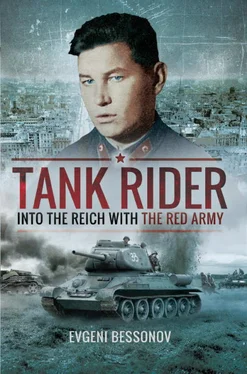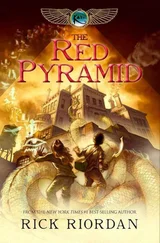I picked up my pistol and map case from the soldier. I went to my soldiers, we had a talk, and I was invited to celebrate our meeting in the evening at dinner. I went to lunch with the Major – the head of the hospital’s department, who had received me. We walked into a room, where the hospital’s doctors were eating, and he introduced me and said that I would eat there together with them and pointed me at my place at the table. Doctors in officers’ ranks, up to Lieutenant Colonel, mostly ladies, were sitting at the table. They were all much older than I was. The doctors did not object and started to ask questions. I had to briefly tell them my life story, it was quite brief – at that time I was not even 22 years old. This is how I started attending the doctors’ canteen, not the ordinary canteen for wounded men and officers. I do not know why they gave me such a privilege. The ladies were very friendly with me; they treated me as an equal and only called me by my first name. They were always busy – the war was still going on and wounded kept on coming in, thus we rarely met in the canteen. But when I met them, I was very embarrassed by their attention, I was not used to such things. I had become alien to people, especially ladies. I slept a lot, enjoying my soft bed. I would hang around the town of Sarau with my soldiers; the town was small, there were few German inhabitants, but there were many Russian women, who were gathered from the whole of Germany in order to go back to Motherland, to the Soviet Union. In the evenings we would watch films in the hospital’s cinema theatre, both Russian and German films. It is interesting that a few days later my wounded orderly Drozd arrived at the same hospital. He told me that if I got wounded, he would also be either killed or wounded by the Germans. He got off with a wound. I was glad to see him. I remembered Sarafanov, Ishmuhammetov and Chechin from the other company. Five to seven men from our battalion were there. Sometimes we would hang around the town together. On one of those days I met the Major, the one that had been wounded in his buttocks. He had recovered from the wound and was again leading the Army’s song and dance ensemble. The Major started to complain to me that some of the singers in the ensemble were giving him a hard time; he was afraid of being beaten up and asked for my help. We walked into a room where the ensemble stayed. Drozd, Chechin and some others were there with me. There was a scandal there again, artists were cursing the Major, I do not remember why, probably because of his affairs with women in the ensemble. The Major addressed me with a request to appease the men in the ensemble. I intimidated them and said that if they continued their disrespectful behaviour, they would have to face my guys and me. It became quiet and we left. I think they took our threats seriously and there were no more complaints.

I am paying so much attention to my stay in the hospital because I would like to emphasize the good care of doctors and nurses and how well they treated the wounded, regardless of their rank. For the first time after long years of military service and war I was in an environment that I had not seen for a long time – quiet, peaceful and slow-paced hospital life. No enemy air force. No bullets whistling in the air, no mines or shells were exploding around. You could sleep as much as you wanted; the only thing to remember was not to miss breakfast, lunch and dinner. You could watch films in the evenings. After a film I would come to my room, take off my jackboots and uniform and lie down on my bed with linen sheets, feather mattress and a pillow. I would receive a new bandage at a specially specified time from young and attentive nurses. It was bliss, real paradise. But I, a fool, wanted to go back to my unit as soon as possible, as if the war would not end without me. But the Major was not in a hurry to let me go, telling me that he would only discharge me when my wounds were fully healed. He would say: ‘Why are you in such a hurry, you have fought enough, the war would be over soon, and you deserve your rest.’ Actually, I do not know myself why I was in such a hurry. Later, when I arrived at the battalion and reported my arrival to Captain Grigoriev, battalion’s chief of staff, he was very amazed and said that they were not expecting me, as they thought I would be sent to another unit from the hospital. They had also deleted me from the personnel lists of the battalion. Battalion commander Major Kozienko and his deputy in political affairs Captain Gerstein also reacted to my return quite indifferently. I was not even recommended for a decoration for the Berlin operation; they either forgot it, or did it on purpose, I have no idea. It’s like that.
Berlin’s garrison surrendered on 2 May. The unconditional surrender of Nazi Germany was signed in Karlhorst, a suburb of Berlin, on 9 May. The Presidium of the Supreme Soviet of the USSR declared the day of 9 May VICTORY DAY.
The Major of the Medical Corps, the head of one of the hospital’s departments, did release me from the hospital before the end of the war. Finally, on 12 May, I was officially discharged from the hospital along with several other soldiers from our company, including my orderly Drozd. On all kinds of transport, sometimes by train, sometimes on bicycles, or hitchhiking, we started our journey to Prague. In Dresden we stole a car. The cars were gathered in a square under guard of the local Soviet command, and we stole a car from under their noses. We did not enjoy the car ride for long, as we ran out of fuel, and we had to abandon it on the highway. We travelled, hitchhiking on a truck almost all the way to Prague and arrived at the battalion on 13 or 14 May, 1945.
Most of the battalion’s officers were happy to see me, except for the battalion’s command, as if I had not fought under their command for almost two years. I managed to obtain by request spirits from the logistics platoon leader and we organized a small party to celebrate both Victory and my return. Lieutenants Guschenkov, Mikheev, Tsikanovski, Popov, Kes, Zemtsev, Senior Lieutenants Chernyshov and Kashintsev, platoon leader Lieutenant Ivan Akazin (he arrived in the company after I was wounded) and others, including the company’s Sergeant Major Mikhail Bratchenko, were present. Lieutenant Petr Shakulo was still recovering from his wounds in a hospital. By the way, the first ones to be transferred to the reserve because of wounds in September and October 1945, were Alexander Guschenkov and Ivan Akazin. Alexander was already 31 years old in 1945 and he had some seven or eight wounds, so he tried his best to leave the army, while Ivan’s right wrist did not function properly again after his wound.
We partied for a long time; someone made a trip to a Czech village and brought more wine, vodka and snacks. I think we partied till dawn – some people were coming, some were leaving, while some were sobering up and coming back to the table. For some reason they had not had a party without me, they were always busy in battles. The war for the battalion was over on 11 May – they had to finish some Germans off after 9 May. Most of the battalion’s soldiers were liberated prisoners of war, Soviet people from concentration camps that abounded around Berlin. We were all happy that we survived, but at the same time we grieved about the dead. As they told me, after my wound at Ketzin the battalion had an order to capture Potsdam; on 27 April, together with the 2nd and the 3rd battalions, they took part in capturing Brandenburg and then had to repel attacks of German units, that were trying to break out of Berlin. Besides that, they also had to repel attacks from the west, from Wenck’s 12th Army, which abandoned its positions against the English and American forces and had been ordered to break through to Berlin to relieve its garrison. After capturing Brandenburg on 6 May, 1945, the Brigade as a part of the 4th Guards Tank Army, carried out a forced march to Czechoslovakia, to Prague, which our Army liberated on 9 May. It was there, in a forest in vicinity of Prague that I found my battalion after my return from hospital.
Читать дальше













